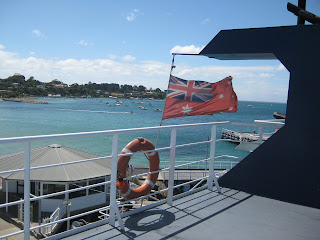The Lion and Albert
There's a famous seaside place called Blackpool,
That's noted for fresh air and fun,
And Mr and Mrs Ramsbottom
Went there with young Albert, their son.
A grand little lad was young Albert,
All dressed in his best; quite a swell
With a stick with an 'orse's 'ead 'andle,
The finest that Woolworth's could sell.
They didn't think much to the Ocean:
The waves, they was fiddlin' and small,
There was no wrecks and nobody drownded,
Fact, nothing to laugh at at all.
So, seeking for further amusement,
They paid and went into the Zoo,
Where they'd Lions and Tigers and Camels,
And old ale and sandwiches too.
There were one great big Lion called Wallace;
His nose were all covered with scars —
He lay in a somnolent posture,
With the side of his face on the bars.
Now Albert had heard about Lions,
How they was ferocious and wild —
To see Wallace lying so peaceful,
Well, it didn't seem right to the child.
So straightway the brave little feller,
Not showing a morsel of fear,
Took his stick with its 'orse's 'ead 'andle
And pushed it in Wallace's ear.
You could see that the Lion didn't like it,
For giving a kind of a roll,
He pulled Albert inside the cage with 'im,
And swallowed the little lad 'ole.
Then Pa, who had seen the occurrence,
And didn't know what to do next,
Said 'Mother! Yon Lion's 'et Albert',
And Mother said 'Well, I am vexed!'
Then Mr and Mrs Ramsbottom —
Quite rightly, when all's said and done —
Complained to the Animal Keeper,
That the Lion had eaten their son.
The keeper was quite nice about it;
He said 'What a nasty mishap.
Are you sure that it's your boy he's eaten?'
Pa said "Am I sure? There's his cap!'
The manager had to be sent for.
He came and he said 'What's to do?'
Pa said 'Yon Lion's 'et Albert,
'And 'im in his Sunday clothes, too.'
Then Mother said, 'Right's right, young feller;
I think it's a shame and a sin,
For a lion to go and eat Albert,
And after we've paid to come in.'
The manager wanted no trouble,
He took out his purse right away,
Saying 'How much to settle the matter?'
And Pa said "What do you usually pay?'
But Mother had turned a bit awkward
When she thought where her Albert had gone.
She said 'No! someone's got to be summonsed' —
So that was decided upon.
Then off they went to the P'lice Station,
In front of the Magistrate chap;
They told 'im what happened to Albert,
And proved it by showing his cap.
The Magistrate gave his opinion
That no one was really to blame
And he said that he hoped the Ramsbottoms
Would have further sons to their name.
At that Mother got proper blazing,
'And thank you, sir, kindly,' said she.
'What waste all our lives raising children
To feed ruddy Lions? Not me!'
Poem: From "The Stanley Holloway Monologues" Elm Tree Books 1979. Source:
Old PoetryWe visited the Adelaide Zoo with some friends from Canberra who were also serendipitously in town. It was a great outing for children, better still for a whole gang like ours. An outdoor experience, up close to unusual animals, lots of green space to run around and toilets near by - the perfect family holiday adventure. But but I still don't like'em. The little furry critters, unnaturally constrained in their small featureless enclosures, either have a look of bored resignation or a manic twitch in their eyes. Wild birds behind bars always look like edgy inmates in an asylum. The big cats seem completely emasculated. Adelaide Zoo was certainly one of the better zoos we have visited. The biturongs - a fascinating cross between a monkey and a bear with the most enthralling howl - have the most beautiful lush, tree-ed enclosure. Perhaps the conservation and animal breeding programs make zoos worthwhile. They just seem so, well, Victorian.




















































